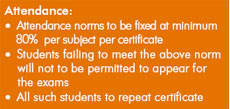
The teaching methodology adopted by the institute will consist of classroom sessions wherein students will be exposed to case studies, experiential learning, role play, scenario building as well as live industry projects. The emphasis will be on developing an understanding of the subject by the students, since they are expected to convert teaching into the application and execution mode. To facilitate this interactive learning process, they will be mentored and subdivided into learning groups or work teams, which will facilitate team working as well as collective learning. Their curriculum would include industry visits, rural visits, societal relief exposures besides industry internships. Students’ participation in all these activities is compulsory.
Selected subjects like Principles of Management, Perspective Management, Strategic Management, etc. will be taught through the Case Study method. For all subjects, students are expected to come to the class well prepared and updated. Faculty may take surprise exams at any point in time during the certificate. During the study, students will be assessed subject wise, based on the weightages mentioned here.
Students are hereby informed that a module based examination will be conducted and those who miss the module or do not appear for the module end examination will have to repeat the module only in the next academic year. Thus there will be no re-exams for absentees.
In case of failures in two or less than two subjects, students will be given a re-exam at the end of each certificate course. Failures in more than two subjects will have to repeat the entire certificate. There will be only one re-exam conducted.

MET Brass Tack is a business Management simulation game, which will hone the management skills of students and help them develop competencies, which the industry is looking for.
MET is one of the pioneering B-School in India to introduce this first-of-its-kind initiative, wherein at the end of each certificate and before the final certificate examinations, workshops would be conducted and would work as 'practicals' for the students, gauging on how strong their fundamentals are, and how effectively and efficiently they can apply them to practical situations.
Every subject will be given a maximum of 1 point for its credit and minimum credit points required to clear the subject is 0.5. These points will be given on the basis of students' marks in the subject.
The certificates will be issued depending upon minimum 0.5 credit received in each subject for the certificate module. e.g. if maximum credit points are 11, minimum 5.5 credit points are required besides minimum 0.5 credit points in each subject.

We achieve employability driven professionals by a radical change in “Innovative Concurrent Evaluation (ICE)” by employing following interiliac methodologies:
| Innovative Concurrent Evaluation (ICE) | |
|---|---|
|
|